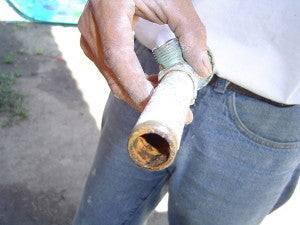
Flint Just the Tip of the Iceberg - Country's Lead Problem Extends Beyond Flint
By Dan DeBaunShare
The recent fallout over the high levels of lead in Flint's drinking water, has highlighted not only the problems this Michigan city is facing in terms of its drinking water quality, but also wider concerns regarding the country's aging drinking water distribution network.
With Earth Day approaching, Jerald Schnoor, a Professor of both Occupational and Environmental Health and Civil and Environmental Engineering at The University of Iowa, has called on government to provide funding to upgrade the nation's water distribution system by replacing deteriorating lead water pipes that distribute drinking water across the country.
In an article recently published in the ACS' Journal of Chemical Education, Schnoor addresses the problem head-on and proposes recommendations on how best to tackle the issue. For many cities across the US — particularly cities in the eastern parts of the country — the water distribution infrastructure was established long before the health risks associated with lead exposure due to lead contamination in drinking water became apparent.
Many of these cities' water distribution networks consist of lead pipes, lead solder and lead faucets that were installed over 50 years ago — and in some cases over 100 years ago — posing a potentially significant health risk to the communities they serve.
Furthermore, the plumbing inside older homes typically consist of lead piping and pipe joints sealed with lead solder, as well as brass tap fittings that contain a high lead component. All these plumbing fixtures and fittings can potentially provide a source of soluble lead which can leach into the household's drinking water. The problem is exacerbated if the water passing through these pipes is corrosive, which can cause the pipes to become corroded, resulting in fine lead particles being deposited into the drinking water.
Modern research has since shown that ingesting lead can have dire health effects in both children and adults, and can result in numerous long term cognitive and other health issues. Yet these legacy lead water pipes remain, delivering drinking water that is potentially contaminated with lead to communities across the country. While water utility companies typically try to take preventative measures to limit lead getting into drinking water by adding chemical additives, according to Schnoor, this approach cannot ensure that drinking water will remain safe all along the network until it flows out of a household tap.
Schnoor suggests that the U.S. Environmental Protection Agency (EPA) needs to address the flaws in the Safe Drinking Water Act to ensure that drinking water quality not only meets safety standards when it leaves the water treatment facility, but that it remains safe to drink when it flows from the consumer's taps. To get a clearer picture of true water quality, sampling needs to be undertaken more frequently, and include points further along the distribution network, including 'dead-ends' within the network and at customer's taps (including both filtered and unfiltered water samples).
According to Schnoor: "Lead pipes are a hazardous legacy, much like the waste sites of old."
He suggests that a national fund be set up to finance the replacement of the outdated water infrastructure, including the service pipelines that link to the home, as well as the internal plumbing within the home, even though this is the homeowners property — for example, funds will need to be set aside to assist economically disadvantaged families living in an old house that is in need of a plumbing upgrade.
Journal Reference Jerald L. Schnoor. Recognizing drinking water pipes as community health hazards. J. Chem. Educ., 2016, 93 (4), pp 581–582. April 12, 2016. DOI: 10.1021/acs.jchemed.6b00218 Image Suggestions
-
Regular price $234.00 USDRegular priceUnit price / per
-
Regular price $327.00 USDRegular priceUnit price / per
-
Regular price From $367.00 USDRegular priceUnit price / per
-
Regular price From $408.01 USDRegular priceUnit price / per
-
Regular price From $451.00 USDRegular priceUnit price / per
-
Regular price From $478.00 USDRegular priceUnit price / per
-
Regular price $332.50 USDRegular priceUnit price / per
$350.00 USDSale price $332.50 USDSale

Dan DeBaun is the owner and operator of Big Berkey Water Filters. Prior to Berkey, Dan was an asset manager for a major telecommunications company. He graduated from Rutgers with an undergraduate degree in industrial engineering, followed by an MBA in finance from Rutgers as well. Dan enjoys biohacking, exercising, meditation, beach life, and spending time with family and friends.
~ The Owner of Big Berkey Water Filters
















